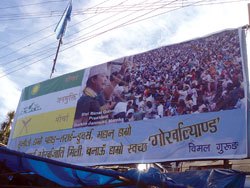|
|
Gorkhaland is suddenly in the news again among India's close to 10 million Nepali-speakers. The new protests are against the Indian government's decision to introduce a bill giving the Subhas Ghising-led Gorkha National Liberation Front (GNLF) rights to self-governance under India's sixth schedule. The 'Gorkhalis' who are protesting want to establish a separate Gorkhaland by 2010.
The people of Darjeeling asked for a separate state in 1907 from the British. But even after a hundred years, this demand has still not been met. The 1986 uprising led by Subhas Ghising and his GNU culminated in a tripartite agreement between the West Bengal government, the central government and Ghising. Twelve hundred people lost their lives and the Indian government quelled the uprising only by creating a Gorkha Darjeeling Hill Council (GDHC) and making the GNLF Subhas Ghising its head.
Ghising's term ended in 2004 but there has been no re-election and he shows no signs of letting the chair go. There was supposed to be an election on 25 March 2005 but on 1 January 2005, Ghising demanded the scrapping of the Hill Council and merger with the sixth schedule of India's constitution. He also demanded the resignations of the 28-member council. Ghising was also appointed acting administrator by the Bengal government. Since then, Ghising has become sole ruler of Darjeeling.
Those who trusted Ghising and hoped for a Gorkhaland have grown disillusioned and are the ones who are involved in the new uprising. The current movement is being championed by the newly formed Gorkha People's Liberation Front (GPLF) and its leader Bimal Gurung. The Revolutionary Communist Party, All India Gorkha League, GNLF 'C' and various other parties oppose the sixth schedule. Other parties including the Gorkha National Congress and the Gorkha Democratic Front have made clear their desire for a Gorkhaland. Even the chief minister of Sikkim, Pawan Chamling has come out in support of Gorkhaland. According to Chamling, Darjeeling deserves to be a separate state because it doesn't have anything in common with the rest of West Bengal in terms of culture, finances or even environment.
Ghising's detractors claim that the sixth schedule will only create rifts within the Gorkhali community and will make Darjeeling a slave to Kolkata while his supporters claim the sixth schedule is a door to Gorkhaland.
Bimal Gurung, a former member of the Hill Council, was a staunch Ghising supporter and his public acceptance is high. Analysts claim that out of Darjeeling's 1.6 million population, 75 percent of them support him. Gurung's popularity soared when he came out in full support of Indian Idol winner Prashant Tamang and even opened a fan club while rival Ghising kept mum.
Former chief minister of Sikkim Nar Bahadur Bhandari says that Ghising needs to properly understand what the sixth schedule means. "The schedule may mean citizen rights but it is not what the people of Darjeeling want. What they want, is Gorkhaland," says Bhandari. According to the Saparivar monthly magazine, Sikkim, with a population of 300,000 voters gets aid worth Rs 5,400 billion but Darjeeling, with more than 1.6 million voters, only gets around Rs 100 billion.
It is now coming down to a showdown between the pro-sixth schedule GNLF and the pro-Gorkhaland GPLF. Although the GPLF was only formed last October, it already holds a lot of support. It sent a representative body to Delhi to halt the schedule and even organised a gherao with over a thousand supports at Ghising's home. But the GNLF has also organised bandas and rallies in support of the schedule.



